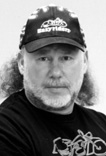 Michael Farabaugh is a leader in grassroots motorcyclists rights organization and rider safety. He was the Executive Director of ABATE of Indiana and from 1978 to 1990 guided that organization from a small group of 600 members to a thriving organization 12,000 strong. He served on the AMA Board of Directors and also helped form, and was president of, the Motorcycle Riders Foundation. Farabaugh was also a chief instructor for Motorcycle Safety Foundation and opened the Movin’ On Motorcycle School. In addition to his considerable contributions to motorcycling rights and safety, Farabaugh is also a master photojournalist, whose work has appeared in numerous motorcycle and general interest publications.
Michael Farabaugh is a leader in grassroots motorcyclists rights organization and rider safety. He was the Executive Director of ABATE of Indiana and from 1978 to 1990 guided that organization from a small group of 600 members to a thriving organization 12,000 strong. He served on the AMA Board of Directors and also helped form, and was president of, the Motorcycle Riders Foundation. Farabaugh was also a chief instructor for Motorcycle Safety Foundation and opened the Movin’ On Motorcycle School. In addition to his considerable contributions to motorcycling rights and safety, Farabaugh is also a master photojournalist, whose work has appeared in numerous motorcycle and general interest publications.
Farabaugh was born in Ridgefield, Connecticut in 1948. Growing up near South Bend, Indiana, Farabaugh was a promising football player. When an injury kept him from football, Farabaugh discovered motorcycling through high school buddies. He bought a Honda 160, but at first kept it at a friend’s garage since his mother didn’t approve of motorcycles. Before long, Farabaugh progressed to bigger bikes and began racing local hillclimb, enduro and hare scrambles races. When he wasn’t racing, Farabaugh was volunteering at the races doing everything from setting up courses to flagging or anything else that needed to be done.
In the late 1960s and early ‘70s, Farabaugh began taking long motorcycle trips across America. His passion for riding would eventually see him log over a million miles on the seat of a motorcycle. A life-long photographer, Farabaugh documented his trips with a camera. Farabaugh became friends with Rider Magazine founder Roger Hull and began contributing photos and articles to that magazine, and eventually other motorcycling publications.
One particular trip led Farabaugh to become more active in fighting for the rights of motorcycle riders.
“I rode up into Michigan and got stopped by a police officer for not putting my feet down at a stop sign,” Farabaugh said. “Just a couple of hours later we stopped at a restaurant on Lake Michigan. The manager of the restaurant saw us coming and locked the doors and wouldn’t let us in. I came home and immediately got involved with the AMA.”
He became passionate about furthering the cause of motorcycle rights. By the 1970s, Farabaugh was elected as his AMA District president and later served in the AMA Congress and as a member of the Board of Trustees. He also helped develop the AMA Eagles curriculum to teach members the history of the role the AMA has had in motorcycling since its inception in 1924. Farabaugh was awarded the AMA Dud Perkins Award in 1994 for his outstanding level of service to the Association.
Farabaugh’s motorcyclists’ rights activism didn’t stop with the AMA. He also headed Indiana’s chapter of ABATE in 1978 and oversaw a tremendous growth spurt in that grassroots organization during his 12-year tenure as president. He founded the national "Meeting of the Minds," from which emerged a National Steering Committee and the Motorcycle Riders Foundation. Under his guidance, the MRF managed to garner enough support from national bike organizations to hire the first full-time lobbyist in Washington, D.C. to push for positive motorcycle legislation.
Farabaugh also helped train hundreds of new riders through his work as a chief instructor with the Motorcycle Safety Foundation. He and his wife Debby started a motorcycle riding school and Farabaugh was awarded the John E. Harley Award, the top achievement in the M.S.F.
Farabaugh was also a pioneer in directing motorcyclists’ contributions to charity through riding events. He became chairman of the Miracle Ride Foundation and coordinated events that donated over $2.5 million to the Paraplegic Foundation and Riley Hospital for Children in Indianapolis.
“My goal was to make motorcycling better for the next generation,” Farabaugh said. “Let’s make it safe and easier to learn to ride. If we as motorcyclists are doing it ourselves, we have a hand in the direction motorcycling takes.”
When inducted in 2002, Farabaugh continued to enjoy riding and being involved in improving the two-wheel lifestyle. His award-winning photos have been featured in galleries, books, calendars, brochures and as an accompaniment to the many motorcycle magazine articles he has published. He and his wife, Debby, lived in the scenic hills of Southern Indiana and raised a son.
Michael Farabaugh passed away in March 2017.